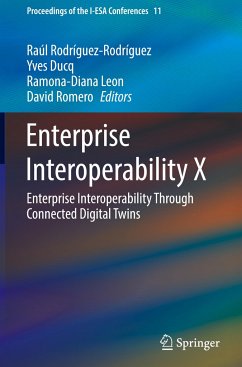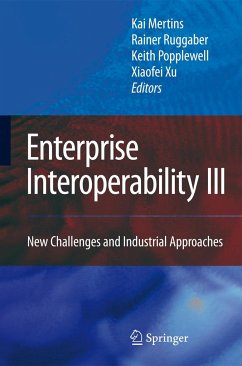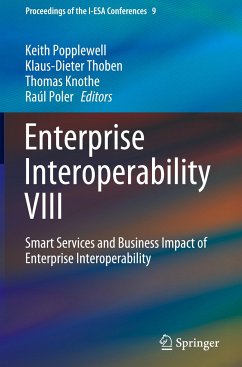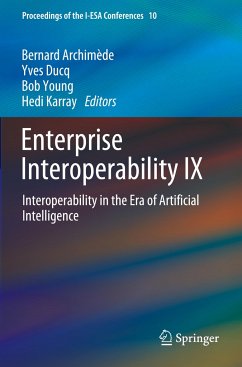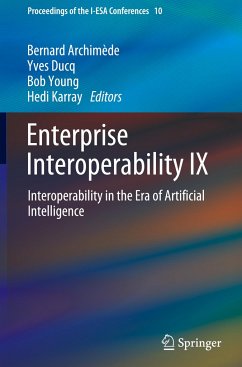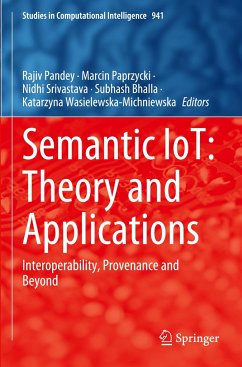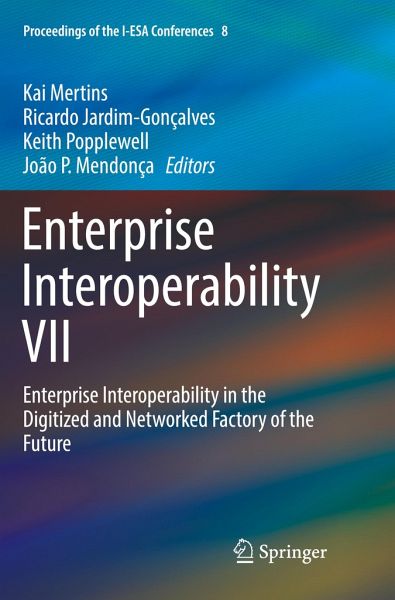
Enterprise Interoperability VII
Enterprise Interoperability in the Digitized and Networked Factory of the Future
Herausgegeben: Mertins, Kai; Jardim-Gonçalves, Ricardo; Popplewell, Keith; Mendonça, João P.
Versandkostenfrei!
Versandfertig in 6-10 Tagen
151,99 €
inkl. MwSt.

PAYBACK Punkte
76 °P sammeln!
A concise reference to the state of theart in systems interoperability, EnterpriseInteroperability VII will be of great value to engineers and computerscientists working in manufacturing and other process industries and tosoftware engineers and electronic and manufacturing engineers working in theacademic environment. Furthermore, it shows how knowledge of the meaning withininformation and the use to which it will be put have to be held in commonbetween enterprises for consistent and efficient inter-enterprise networks.Over 30 papers, ranging from academicresearch through case studies to indus...
A concise reference to the state of theart in systems interoperability, EnterpriseInteroperability VII will be of great value to engineers and computerscientists working in manufacturing and other process industries and tosoftware engineers and electronic and manufacturing engineers working in theacademic environment. Furthermore, it shows how knowledge of the meaning withininformation and the use to which it will be put have to be held in commonbetween enterprises for consistent and efficient inter-enterprise networks.
Over 30 papers, ranging from academicresearch through case studies to industrial and administrative experience ofinteroperability show how, in a scenario of globalised markets, where thecapacity to cooperate with other organizations efficiently is essential inorder to remain economically, socially and environmentally cost-effective, themost innovative digitized and networked enterprises ensure that their systems and applications are ableto interoperate across heterogeneous collaborative networks of independent organizations.This goal of interoperability is essential, not only from the perspective ofthe individual enterprise but also in the business structures that are nowemerging, such as complex collaborating networks of suppliers and customers,virtual enterprises, interconnected organisations or extended enterprises, aswell as in mergers and acquisitions. Establishing efficient and relevantcollaborative situations requires the management of interoperability from adynamic point of view: a relevant and efficient collaboration of organizations mayrequire adaptation to remain in line with changing objectives, evolvingresources, unexpected events, etc. Many of the papers contained in this, the eighthvolume of Proceedings of the I-ESAConferences have examples and illustrations calculated to deepenunderstanding and generate new ideas.
The I-ESA'16 Conferencefrom which this book is drawn was organized by the Escola de Engenharia daUniversidade do Minho, on behalf of the European Virtual Laboratory for EnterpriseInteroperability (INTEROP-VLab) and Interop VLab Portuguese Pole.
Over 30 papers, ranging from academicresearch through case studies to industrial and administrative experience ofinteroperability show how, in a scenario of globalised markets, where thecapacity to cooperate with other organizations efficiently is essential inorder to remain economically, socially and environmentally cost-effective, themost innovative digitized and networked enterprises ensure that their systems and applications are ableto interoperate across heterogeneous collaborative networks of independent organizations.This goal of interoperability is essential, not only from the perspective ofthe individual enterprise but also in the business structures that are nowemerging, such as complex collaborating networks of suppliers and customers,virtual enterprises, interconnected organisations or extended enterprises, aswell as in mergers and acquisitions. Establishing efficient and relevantcollaborative situations requires the management of interoperability from adynamic point of view: a relevant and efficient collaboration of organizations mayrequire adaptation to remain in line with changing objectives, evolvingresources, unexpected events, etc. Many of the papers contained in this, the eighthvolume of Proceedings of the I-ESAConferences have examples and illustrations calculated to deepenunderstanding and generate new ideas.
The I-ESA'16 Conferencefrom which this book is drawn was organized by the Escola de Engenharia daUniversidade do Minho, on behalf of the European Virtual Laboratory for EnterpriseInteroperability (INTEROP-VLab) and Interop VLab Portuguese Pole.



